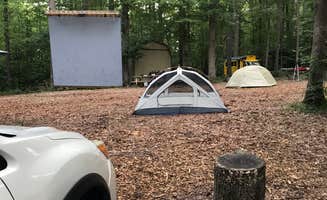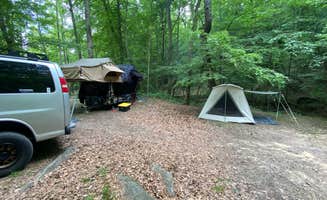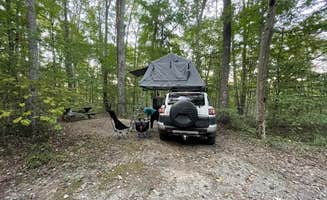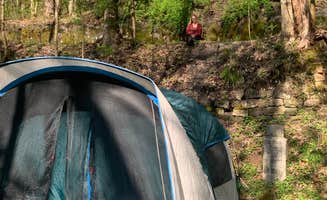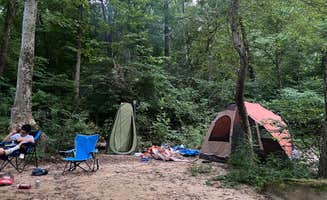Tent camping near Charleston, West Virginia offers access to scenic gorges and forested mountain terrain throughout the Appalachian region. The area receives approximately 44 inches of rainfall annually, creating lush vegetation and numerous waterways for paddling and fishing. Summer temperatures typically range from 60°F to 85°F, making lightweight tents and rain protection essential camping gear.
What to do
Hiking trails: Accessible directly from Stone Cliff Campground, the nearby trail system offers riverside walking routes. One reviewer noted, "There is a great trail nearby that runs along the river."
Kayaking on mountain lakes: Plum Orchard Lake WMA provides quiet water paddling opportunities on its 202-acre lake. A visitor mentioned it's a "Great place for kayaking on a beautiful lake nestled in the mountains of Fayette county."
Disc golf course: Athletic campers can enjoy outdoor games at Chestnut Creek Campground, where one camper highlighted that the grounds "Has a Frisbee/Disc Golf Course" among the wooded setting.
Train watching: Several campgrounds sit near active rail lines that follow the river valleys. At Brooklyn Campground, a visitor observed, "The view of the river is beautiful and you can watch trains pass on the opposite side of the river."
What campers like
Boulder settings: The New River Gorge Campground offers unique tent platforms built among natural rock formations. One camper shared, "We were lucky to get campsite 23, which had a tent platform high up on a boulder. The campsite was fairly quiet and cozy!"
Riverside camping: Sandy beaches at several campsites provide direct water access. A Stone Cliff camper commented, "Very quiet, sand bottom site areas right on the water."
Cell reception: Unlike many remote camping areas, some campgrounds maintain good connectivity. At Chestnut Creek Campground, a visitor noted, "Cell reception was great all throughout this area. That's not a camping necessity for us, but we all noticed that everyone's phone had great reception with a variety of network providers."
Campsite privacy: Natural vegetation creates separation between sites at certain campgrounds. A Chestnut Creek visitor mentioned, "This is a very nice little campground set up for tents, hammock campers and some car campers. No hook-ups. Definitely not for RVs or Camper trailers. All the sites are wooded."
What you should know
Road access challenges: Many campgrounds require driving on unpaved roads. At Plum Orchard Lake WMA, a camper warned of a "Long, bumpy dirt road to reach the campsite—it could be fun in the right vehicle."
Water sources: Pack your own drinking water for most sites. At the Brooklyn Campground, a visitor noted, "We came out of regular camping season so we couldn't find anywhere near by that sold firewood."
Train noise: Railroad tracks follow river valleys and can disturb light sleepers. One camper at Brooklyn Campground advised, "Note for light sleepers: there is an active railroad across the river and there were probably 5-10 trains the Wednesday night that we stayed."
Bathroom facilities: Restroom quality varies significantly between locations. A review of Chief Cornstalk Wildlife Management Area cautioned, "There is an out house that looks like something from an 80's horror movie... It oughta be bulldozed."
Payment systems: Different campgrounds use various payment methods. At Stone Cliff Campground, campsites are "first come first serve basis. Also can access by boat if taking a trip on the river."
Tips for camping with families
Consider shower facilities: For multi-day trips with children, prioritize campgrounds with cleaned facilities. At Riverside R&R, bathing options are limited, so families should pack accordingly.
Handicap-accessible options: Some campgrounds offer specific sites designed for easier access. At Brooklyn Campground, a visitor noted, "There is 1 handicap site and 4 sites by the river. The handicap site is the only one that you can drive directly up to."
Campground supervision: Family-run operations often provide additional safety and support. At Chestnut Creek Campground, a visitor shared, "The owner is just a text or call away and he replies very quickly. It was quiet with just faint noise from the highway, but not very noticeable."
Wildlife viewing opportunities: Children can observe native species in their natural habitats. A Plum Orchard Lake WMA visitor reported, "We were able to see deer, raccoons and some nice looking birds."
Tips from RVers
Size restrictions: Most tent camping areas near Charleston have limited RV capacity. A Chestnut Creek reviewer warned, "This is a very nice little campground set up for tents, hammock campers and some car campers. No hook-ups. Definitely not for RVs or Camper trailers."
Alternative parking: At some sites, RVs must use designated parking areas separate from tent sites. At Brooklyn Campground, "The 4 sites by the river have a parking lot and you walk (not very far at all, 10 - 50 yards) to them."
Seasonal considerations: Off-season camping may mean limited facilities. One Brooklyn Campground visitor shared, "We came out of regular camping season so we couldn't find anywhere near by that sold firewood."


